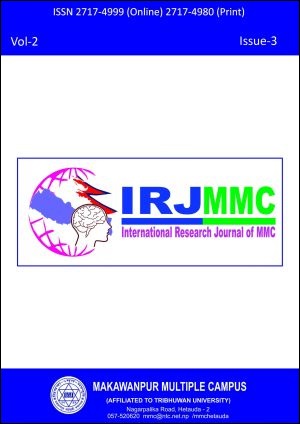Challenges of BFIs in Cash Transfer Program to Earthquake Affected Victims: Lessons from Nepal’s Earthquake 2015
DOI:
https://doi.org/10.3126/irjmmc.v2i3.40057Keywords:
Access to Finance, Banks and Financial Institutions (BFIs), Cash transfer, Earthquake Beneficiaries, Financial Assistance, Financial Literacy, Post-Earthquake, ReconstructionAbstract
The government of Nepal successfully managed the post-earthquake housing reconstruction and rehabilitation endeavours in the aftermath of Nepal’s earthquake 2015, where more than 800,000 Earthquake affected households were identified as beneficiaries and provided financial assistance to build their house. The purpose of this research is to explore the challenges faced by the Banks and Financial Institutions (BFIs) during the cash grant distribution procedures for the earthquake beneficiaries. This paper is prepared to explore the Government of Nepal’s private housing reconstruction initiatives as an effort to cope with the post-earthquake reconstruction and rehabilitation works and the role of BFIs in disbursing of the government’s conditional cash transfer program to the identified earthquake beneficiaries. The study had collected data from 16 BFIs where 53 respondents participated in the study. It is based on the qualitative design because structured interview was conducted to collect the data. The findings show that private housing reconstruction endeavours focusing on the cash transfer programs of the GoN were more effective, where 99% of the beneficiaries received the 1st Tranche as of June 2021. Though, there were several challenges shared by the respondents during the grant transfer mechanism such as human resource management, lack of financial literacy and understanding of bank-related services, lack of adequate coordination among the concerned stakeholders, merger and acquisition of BFIs, beneficiaries’ ownership/nominee transfer, cash management, mismatch of the beneficiaries name, and reconciliation and data verification.The study would be crucial to learn important lessons from Nepal’s post-earthquake reconstruction for future disaster resilience activities

